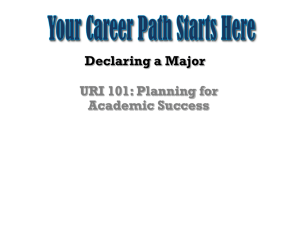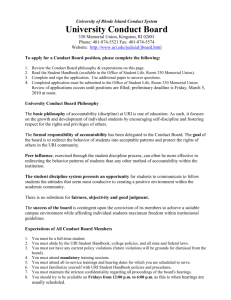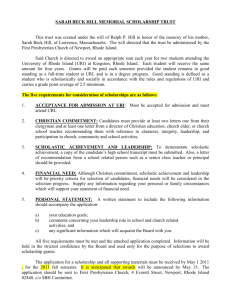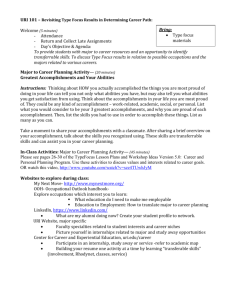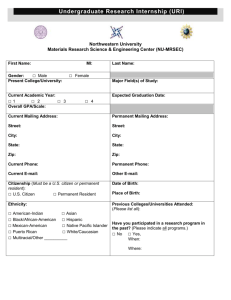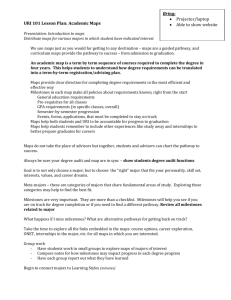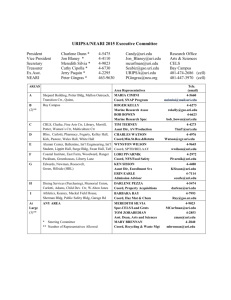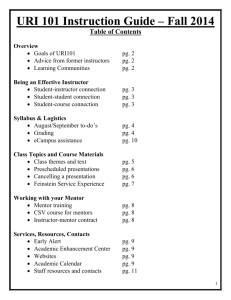URI 101 FALL 2015 Syllabus Template
advertisement
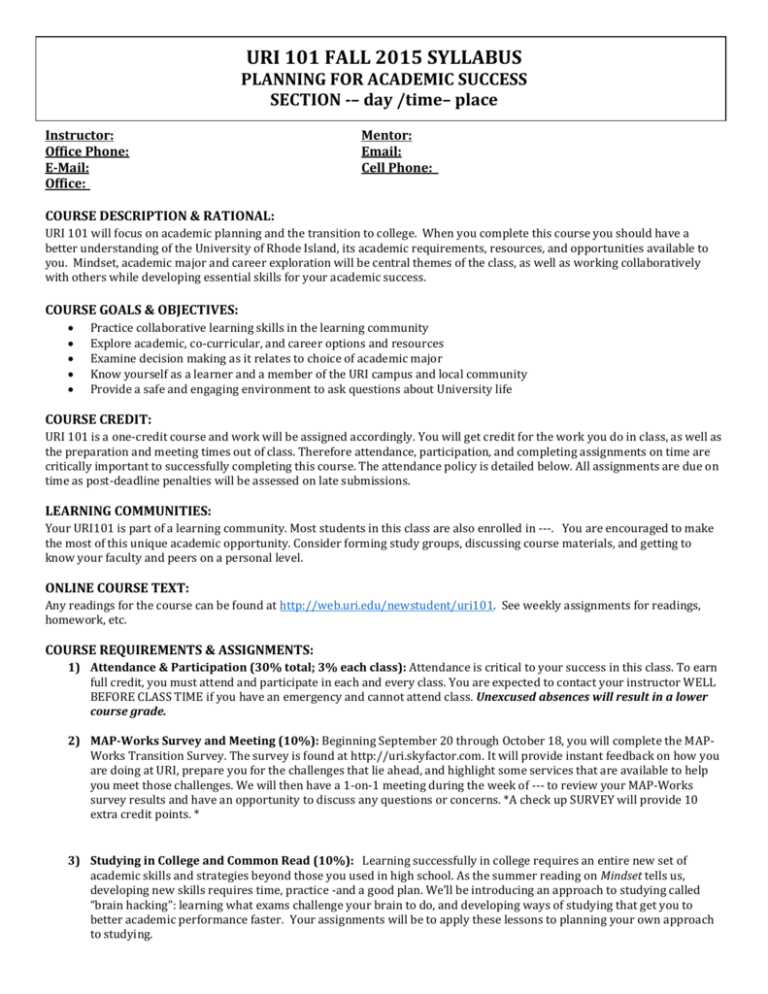
URI 101 FALL 2015 SYLLABUS PLANNING FOR ACADEMIC SUCCESS SECTION -– day /time– place Instructor: Office Phone: E-Mail: Office: Mentor: Email: Cell Phone: COURSE DESCRIPTION & RATIONAL: URI 101 will focus on academic planning and the transition to college. When you complete this course you should have a better understanding of the University of Rhode Island, its academic requirements, resources, and opportunities available to you. Mindset, academic major and career exploration will be central themes of the class, as well as working collaboratively with others while developing essential skills for your academic success. COURSE GOALS & OBJECTIVES: Practice collaborative learning skills in the learning community Explore academic, co-curricular, and career options and resources Examine decision making as it relates to choice of academic major Know yourself as a learner and a member of the URI campus and local community Provide a safe and engaging environment to ask questions about University life COURSE CREDIT: URI 101 is a one-credit course and work will be assigned accordingly. You will get credit for the work you do in class, as well as the preparation and meeting times out of class. Therefore attendance, participation, and completing assignments on time are critically important to successfully completing this course. The attendance policy is detailed below. All assignments are due on time as post-deadline penalties will be assessed on late submissions. LEARNING COMMUNITIES: Your URI101 is part of a learning community. Most students in this class are also enrolled in ---. You are encouraged to make the most of this unique academic opportunity. Consider forming study groups, discussing course materials, and getting to know your faculty and peers on a personal level. ONLINE COURSE TEXT: Any readings for the course can be found at http://web.uri.edu/newstudent/uri101. See weekly assignments for readings, homework, etc. COURSE REQUIREMENTS & ASSIGNMENTS: 1) Attendance & Participation (30% total; 3% each class): Attendance is critical to your success in this class. To earn full credit, you must attend and participate in each and every class. You are expected to contact your instructor WELL BEFORE CLASS TIME if you have an emergency and cannot attend class. Unexcused absences will result in a lower course grade. 2) MAP-Works Survey and Meeting (10%): Beginning September 20 through October 18, you will complete the MAPWorks Transition Survey. The survey is found at http://uri.skyfactor.com. It will provide instant feedback on how you are doing at URI, prepare you for the challenges that lie ahead, and highlight some services that are available to help you meet those challenges. We will then have a 1-on-1 meeting during the week of --- to review your MAP-Works survey results and have an opportunity to discuss any questions or concerns. *A check up SURVEY will provide 10 extra credit points. * 3) Studying in College and Common Read (10%): Learning successfully in college requires an entire new set of academic skills and strategies beyond those you used in high school. As the summer reading on Mindset tells us, developing new skills requires time, practice -and a good plan. We’ll be introducing an approach to studying called “brain hacking”: learning what exams challenge your brain to do, and developing ways of studying that get you to better academic performance faster. Your assignments will be to apply these lessons to planning your own approach to studying. Assignment 1 (due): Read two short articles and prepare to talk about them in class. https://www.mindsetworks.com/websitemedia/youcangrowyourintelligence.pdf http://ww2.kqed.org/mindshift/2014/10/16/studying-with-quizzes-helps-make-sure-the-material-sticks Assignment 2 (due) Read article below and do the written assignment which follows. Bring the written assignment to class in week three. http://www.ernweb.com/educational-research-articles/learning-techniques-effective-study/ Written Assignment In college, “studying” describes everything you do that contributes to your learning, not just what you do immediately before a test. With so much to learn and so little time for professor-led activity, a big part of studying successfully is being “self-directed” – that is, knowing what you need to do to learn and finding study methods that help. In our first couple of weeks of class, we talked about what the science of learning tells us about how to study. In week three, we are going to start putting some of what we are learning to work –individually, and together. To prepare please do the following two things: 1.) Assess of your overall approach to learning in your first few weeks as a college student, addressing the following questions and any others you think are important. How are you feeling about the first couple of weeks of classes? Why do you feel this way? Describe some things you know are going to challenge you as a learner. It can be course content, teaching styles, your study techniques, your use of time – anything that can help you think about how to direct your efforts. List each of these challenges out. For each challenge you list, write one thing you will do this week as a first step to address it. What do you need to know or understand better in order to take this step? 2.) In week two we chose a course from your learning community with which to help one another. In week three, we will brainstorm some approaches to studying for this course. To prepare for this, come up with five suggestions for applying any of the high utility or moderate utility techniques from this week’s article (Don’t worry if you’re not sure. The important thing is to try and generate ideas). 4) Self-Knowledge as a Learner and Major Exploration Assignments (20%): Throughout the semester, we will assign activities and exercises that are designed to help you explore majors. These assignments are suited for all students, whether you have a major or not. Sample assignments include examining your decision making processes and personality, researching URI academic programs, and exploring careers – all coupled with plenty of self-reflection. Assignment #1: Choosing your college major and future career path are among life’s biggest decisions. The more educated and informed you are, and the better you understand the decision-making process - the better decisions you will make. Knowing what majors are available to you is the next important phase of deciding your future academic direction. Gathering information from primary sources is important. To begin this process, print the list of all majors found at uri.edu/advising/majors/. 1. Print the list 2. Cross off majors you know you do not want 3. Circle the majors you need more information about before deciding 4. Highlight majors/colleges/fields you may be interested in. Next, begin to narrow down the possibilities to 2 or 3 majors by doing some research on these majors. To truly understand the degree requirements, consider the following: General Education Requirements College/Major Requirements (look at the course descriptions for the upper level required courses) Elective Credits (for study abroad, internships, and minors). Assignment #2: Choosing a major is only one step toward exploring a number of career paths. In fact, any major can prepare you for multiple careers. Almost every career includes people who majored in diverse academic fields. It is not uncommon for students to change majors several times during college as their interests develop and they are exposed to new areas. We are a unique blend of personality, interests, talents and abilities, values, and of course, limitations. Learning about YOU through self-explorations is a CRITICAL step in making realistic academic and career decisions. Begin your exploration with these two websites: What Can I Do With This Major? http://whatcanidowiththismajor.com/major/majors/ Lists 88 college majors leading to Areas of Work, Employers, and Information/Strategies you should know about to be more marketable when you graduate. My Next Move http://www.mynextmove.org/ 1. 2. 3. Select → http://www.mynextmove.org/explore/ip → (“Tell us what you like to do.”) Take the Interest Profiler, a quick assessment that provides a link between interests and careers Now, explore careers on mynextmove.org through the first portal (search careers with keywords). Select at least 2 careers and complete the following questions for each. What are the skills, abilities, personality traits and technology necessary for each career? Which skills and technology capabilities do you need to develop to be successful in the career? Review your curriculum sheet and the course catalogue. What courses can you take as early as next spring to begin to develop these skills? 5)Build Your Resume through Campus Involvement: Attendance & Handout (5%): Becoming involved in a campus organization is a great way to meet other people on campus who share similar interests, strengthen your resume, and help you learn time management skills. Show us how you get involved in the URI Community by participating in our social media campaign: #URInvolved on instagram or twitter (choose one social media platform). Post the following four prompts in order to receive full credit for the assignment by Nov 2nd. 1. Something you did in High School. Find an extracurricular activity at URI that you did in high school. 2. Something you've never done before that you hope to learn more about or become good at doing. 3. Something you're already good at doing and want to continue in college. 4. Something that peaks URInterest. Find something that sparks idea or feeling in which you are interested. Tips and Tricks: You must be present at either the activity or meeting of your post/picture— posting a flyer of the event or activity is not credit worthy. Use the hashtag #URInvolved and #URI101EVL. (Due) 6) Diversity Week Event (10%): Diversity Week (September 27- October 3) celebrates the importance of diversity and inclusion in higher education, the workplace, and in the global arena. You are welcome to attend as many events as you like. For this assignment, you must attend at least 1 event and type a reflection (due) about the experience. A detailed schedule of Diversity Week activities can be found at www.uri.edu/mcc. 7) Feinstein Civic Engagement (15%): CIVIC ENGAGEMENT: THE FEINSTEIN EXPERIENCE (10 points) You are participating in the 20th Anniversary of the Feinstein Enriching America Program (FEAP)! Since 1995 the Feinstein Experience has provided URI101 students the opportunity to serve the community, providing an average of 10,000 hours of service each fall Register online: www.uri.edu/volunteer and click on the Feinstein Experience to choose from 50 service projects OR learn about the projects and sign up for a one (or more) at the Feinstein Experience Project Fair on Wednesday, September 16, 2015 – Memorial Union Sidewalk 11am-3pm or at the Involvement Fair on September 24, 2015 – Memorial Union Courtyard 11am-2pm. To receive full credit, you must attend your selected project and complete the reflection assignment (see below), due in class not later than November 9th when we meet for the library. We provide transportation to and from the project, and any necessary food and/or supplies. Once you register for a project, you will receive a confirmation with all the details including meeting/project location and preparation. Project time includes travel, SO YOU MUST BE ON TIME! Reflection Assignment: What? So What? Now What? What happened? What type of service did you do? What was the most important part of the day? Who was present? So what? What did you learn during your project? What difference did this service project make to others? Did anything surprise you during the project? How did those you were serving react to the service? What did you notice about how your classmates worked together? Now What? What are some of the root causes of the issue you were working on? Can those causes be addressed? How does this project relate to your major or career choice? What kind of service would you do in the future? GRADING POLICY: 1) 2) 3) 4) Attendance & Participation: MAP-Works & Meeting: Studying in College: Major Exploration: 30% 10% 10% 20% Total: 5) Build Your Resume 6) Diversity Week: 7) Civic Engagement Bonus points map works check up 5% 10% 15% 10% 100% COURSE SCHEDULE AND ASSIGNMENT DUE DATES DATE Week 1: Week 2: Week 3: Week 4: Week 5: Week 6: Week 7: Put when your class meets Week 8: Week 9: Put when your class meets Week 10: Nov. 16 TOPIC(S) OF CLASS Instructor, mentor and student introductions: - Review of Syllabus - Mindset #rhodydriven - Orientation Video You can learn anything Studying in College 1: Learning how to learn -Brain hacking: tapping into your brain’s natural abilities Studying in College 2: Developing College Study Strategies: -To study for tests, test for study! - Developing your own plan - Where and how to learn more Major and Careers - Lists of majors -Degree Requirements INDIVIDUAL MEETINGS WITH ME FOR MAPWORKS Preparing for Academic Advising: - How to use academic maps / curriculum sheets - Making the most of your advising appointment - uri.edu/advising - eCampus: holds, making appointments, tasks, appointment day/times - Reflect on fall classes Determining an Academic and Career Path: - Self Assessment (mynextmove.org) third portal - Review career/occupation websites * www.mynextmove.org * http://whatcanidowiththismajor.com/major/ - Education to employment: how to translate major into career planning Campus Health & Safety: Class meets in Women’s Center on Upper College Rd. NOTE: WE MEET AT THE WOMEN’S CENTER ASSIGNMENT(S) DUE BY THE START OF CLASS Student Information Sheet (in class) Sept 16 – study abroad and service learning fair September 24 – involvement fair Studying in College Assigned readings 1 and 2 DIVERSITY WEEK Studying in College Assigned reading 3 and written assignment Self-Knowledge as a Learner and Major Exploration Assignment #1 Complete MAP-Works before class. Bring a laptop to class Self-Knowledge as a Learner and Major Exploration Assignment #2 Diversity reflection due Build your resume and network through involvement: - Finding leadership/involvement opportunities to complement your strengths - How do you spend your time? How to get involved? - Know what’s happening? Use the Event Calendar! -Network within your URI community LIBRARY NOTE: WE MEET AT THE LIBRARY #URInvolved – Involvement assignment Log on to Rhodynet for internship and career resources web.uri.edu/experience/rhodynet/ This is just the beginning: - Beyond 101: preparing for major and career success - Preparing for spring semester - Research, internships, other opportunities -UCS 160 and UCS 270 -Maintain study groups in learning community -Mindset Civic Engagement reflection Hand in your service reflection paper ADDITIONAL COURSE POLICIES: ACCOMMODATIONS AND SERVICES: Any student with a documented disability is encouraged to contact their professor early in the semester to work out reasonable accommodations to support your success in your courses. Students should also contact Disability Services for Students, Office of Student Life, 330 Memorial Union, 401-874-2098. CLASS ATTENDANCE: The course catalogue (8.33.13) states “Students who are absent from the first and second class meetings of a course and who do not notify the course instructor of their intention to attend future class meetings may be dropped from the class.” Furthermore, attendance in every class is very important in this course. Attendance will be taken throughout the semester and absences will result in a lower grade. Please contact us if there is an emergency and you cannot attend class. ACADEMIC ENHANCEMENT CENTER: To do the best you can, it’s a good idea to visit the Academic Enhancement Center (AEC) 4th floor, Roosevelt Hall. The AEC offers a comfortable environment in which to study alone or together, with or without a tutor. AEC tutors can answer questions, clarify concepts, check understanding, and help you to study. You can make an appointment or walk-in during office hours -- Monday through Thursday from 9 am. to 9 pm, Friday from 9 am to 1 pm, and Sunday from 4 pm. to 8 pm. For a complete schedule - including when tutors are available - go to www.uri.edu/aec, call (401) 874-2367, or stop by the fourth floor in Roosevelt Hall. The WRITING CENTER: The Writing Center is for all writers, all disciplines, at all levels, and all stages of writing. If possible, call ahead for an appointment (874-4690). Drop-in tutorials are often available. You may make repeat appointments, requesting the same tutor each time if you wish. Go to http://www.uri.edu/artsci/writing/center/index.shtml for tips on how to make the best of your Writing Center visit. ACADEMIC DISHONESTY: All submitted work must be your own. If you consult other sources (class readings, articles or books from the library, articles available through internet databases, or websites) these MUST be properly documented, or you will be charged with plagiarism and will receive a 0 for the paper. In some cases, this may result in a failure of the course as well. In addition, the charge of academic dishonesty will go on your record in the Office of Student Life. If you have any doubt about what constitutes plagiarism, visit the following website: http://gervaseprograms.georgetown.edu/hc/plagiarism.html, the URI Student Handbook, and UNIVERSITY MANUAL sections on Plagiarism and Cheating at http://www.uri.edu/facsen/8.20-8.27.html - cheating. ANTI-BIAS: Each member of the University community has the responsibility to foster an environment of acceptance, mutual respect and understanding. If you are a target or a witness of a bias incident, you are encouraged to contact the URI Bias Response Team www.uri.edu/student_life/brt where you will find people and resources to help. FALL 2015 ACADEMIC CALENDAR 9/9 9/9-9/15 9/16-9/22 9/22 9/30 10/1 10/12 10/21 10/27 11/11 Classes begin Open add period Permission number late add period Last Day to ADD Last day to DROP without transcript notation Classes dropped on/after this date, “W” transcript notation Columbus Day- classes meet Last day to DROP Mid-semester grades available in e-campus Veteran’s Day- no classes 11/26-11/29 12/11 12/14 12/15-12/18 12/21-12/22 12/28 Thanksgiving Recess Last day of classes Reading (study) days Final exams Final exams All grades available in e-Campus EVENTS & OPPORTUNITIES: Date/Time Wednesday, September 16 (11a-2pm) Wednesday, September 16 (11a-3pm) Wednesday, September 24 (11a-2pm) Monday, September 28 (11a-3pm) September 27 – October 3 Tuesday, October 13 (3p-430p) Event/Opportunity Study Abroad Fair (MU Ballroom) Feinstein Experience Project Fair Student Involvement Fair (MU Lawn) Careers for the Common Good –Fair (Quad) Diversity Week (www.uri.edu/mcc) Majors & Minors Fair (MU Ballroom)
